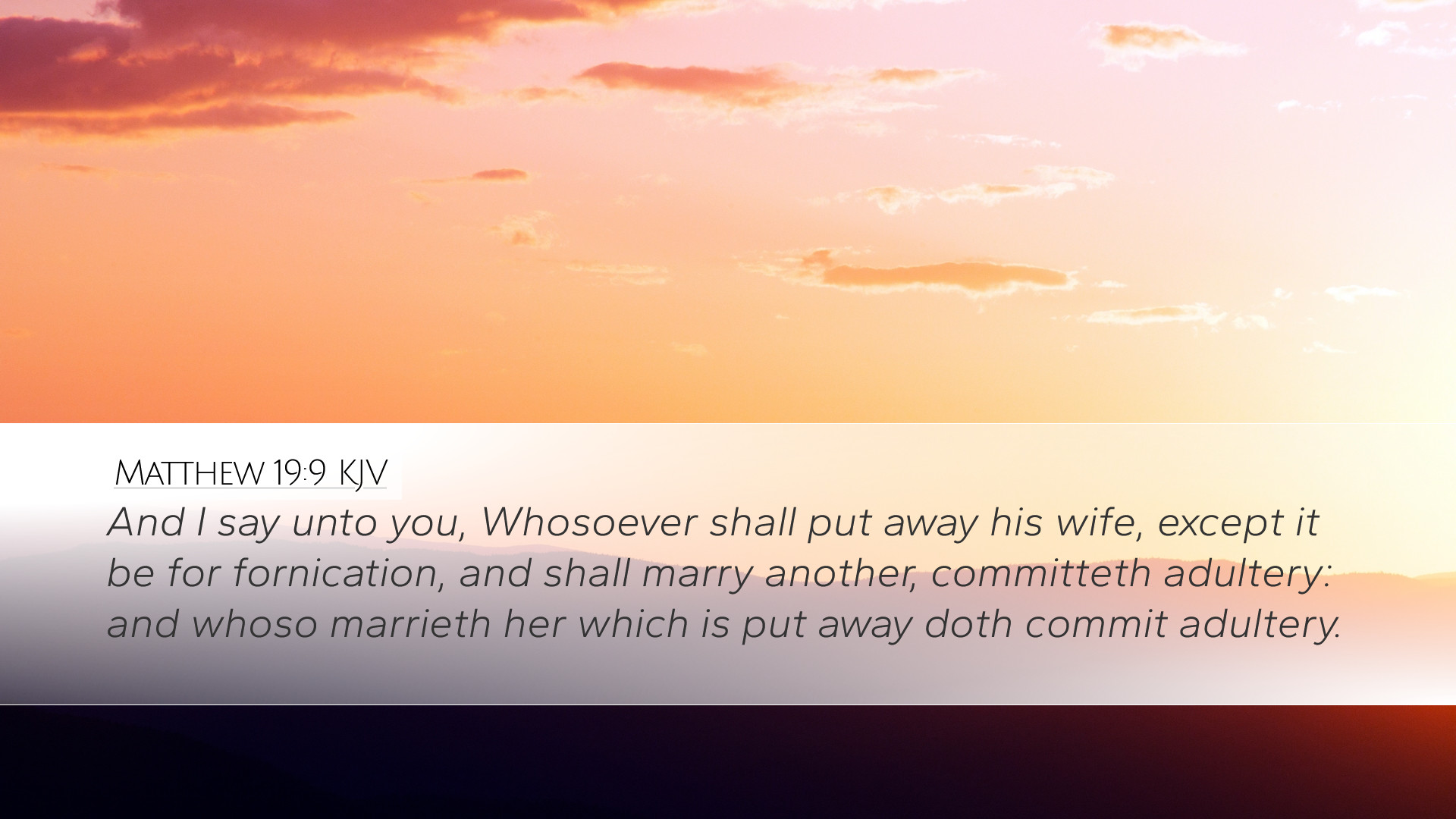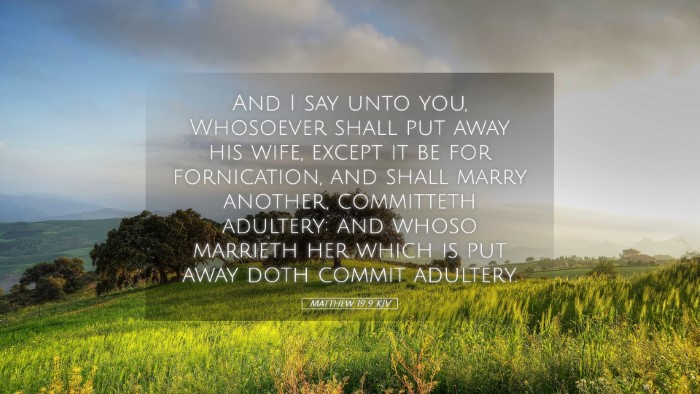Commentary on Matthew 19:9
Matthew 19:9 states: "And I say unto you, Whosoever shall put away his wife, except for fornication, and shall marry another, committeth adultery: and whoso marrieth her which is put away doth commit adultery." This verse has provoked significant theological discussion and has been interpreted in various ways throughout Christian history. Below is an analysis drawn from notable public domain commentaries.
Understanding Divorce and Remarriage
At the heart of this verse lies the issue of divorce and remarriage. In the cultural context of first-century Judea, divorce was common and often conducted with little regard for the sanctity of marriage. Jesus addresses this laxity, pressing upon His audience the gravity of breaking marital vows.
Matthew Henry's Commentary
Matthew Henry emphasizes the seriousness of marriage, highlighting that it is a divine ordinance meant for lifelong commitment. He notes:
- Divorce is permitted only in cases of fornication. Henry emphasizes that this stipulation is significant as it underscores the sanctity and exclusivity of marital vows.
- Remarriage after divorce is addressed sternly. According to Henry, marrying another while still bound by the original covenant constitutes adultery, thus straying from God's original design for marriage.
Henry’s perspective conveys that every aspect of marriage, including its dissolution, must align with God's purposes as outlined in Scripture.
Albert Barnes' Observations
Albert Barnes provides a rich commentary on the implications of this verse, focusing on the broader context of Jesus' teachings on marriage:
- The exception clause. Barnes points out that the phrase "except for fornication" serves as a critical qualifier. This suggests that while divorce is generally frowned upon, there are specific circumstances where it is warranted, primarily due to unfaithfulness.
- Context matters. Barnes reminds readers that Jesus’ teaching reflects a return to the original intent of marriage as instituted by God, thus challenging the prevailing attitudes of His time.
His commentary encourages a balanced approach, acknowledging human frailty while urging adherence to God's ideal for marriage.
Adam Clarke's Insights
Adam Clarke explores the historical and cultural backdrop of Jesus' teaching, noting:
- Hebrew laws on divorce. Clarke delves into the Mosaic law, where Deuteronomy 24:1-4 gives guidelines for divorce. He connects this to Jesus' earthly ministry, demonstrating how Jesus reinterprets these norms in light of God’s intention for unity.
- Adultery defined. Clarke expands on the idea of adultery, explaining that the act of marrying a divorced person who has not been biblically justified through legitimate grounds is viewed as a transgression against divine law.
Clarke's analysis highlights the transformative impact of Christ's teaching, moving from legalistic interpretations to a focus on the heart's motives and faithfulness in relationships.
Theological Implications
The discussion surrounding Matthew 19:9 inevitably leads to broader theological considerations regarding grace, repentance, and the nature of God's law. The following points are derived from the synthesis of the commentaries:
- Divine grace amidst brokenness. While the verse sets clear boundaries regarding divorce and remarriage, it also opens a door for individuals who may have experienced the pain of marital failure to find hope and restoration in Christ.
- Commitment to lifelong fidelity. The underlying message is a call to commitment in marriage, encouraging couples to work toward reconciliation and healing rather than immediate separation.
- Adultery and repentance. The verse underscores the need for repentance and acknowledgement of sin when marital covenants have been broken, emphasizing God’s mercy for those willing to turn back to Him.
Practical Applications for Pastors and Theologians
Leaders in the church can draw significant insights from this verse and its commentaries that may guide their ministry:
- Counseling on marriage. When counseling couples, understanding the weight of this scripture can help pastors guide them towards healing and encourage a commitment to resolve conflicts biblically.
- Teaching on human relationships. The complexity of human relationships necessitates teaching that not only expounds on the law but also emphasizes grace, reminding congregants of the importance of faithfulness in their commitments.
- Addressing divorce sensitively. When discussing divorce, church leaders should approach the topic with compassion, helping individuals navigate their paths while remaining true to biblical teachings.
Conclusion
Matthew 19:9 serves as a pivotal verse in the discourse on marriage, divorce, and adultery. The insights provided by commentaries from Matthew Henry, Albert Barnes, and Adam Clarke coalesce into a profound understanding of Jesus’ teachings. It is a call to uphold the sanctity of marriage and to pursue deeper, covenantal relationships that reflect Christ’s commitment to His Church.
In embracing these teachings, pastors, scholars, and students of theology are equipped to navigate the complexities of marital relationships while advocating for reconciliation, healing, and unwavering fidelity.


